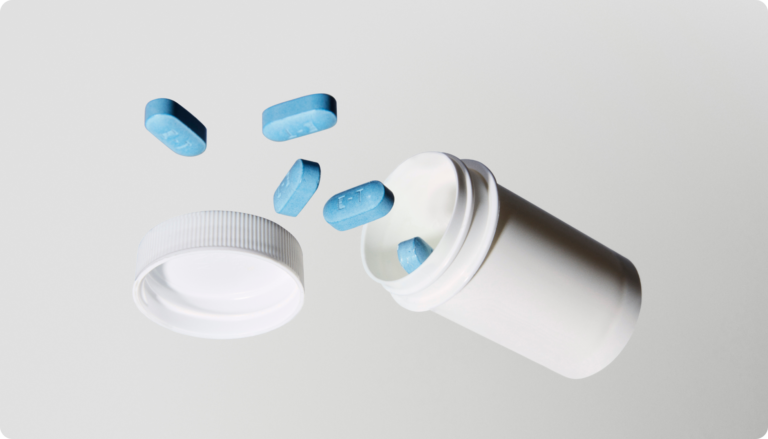Protecting ourselves against the viruses in our lives has become an enormous part of our culture over the last couple of years. The rise of COVID showed us the importance of masking, distancing, and sanitizing.
By the same token, there are other viruses that are harder to protect ourselves against with methods like these. Human immunodeficiency virus (HIV) is one of these types of viruses.
Thankfully, there are options that we can use to reduce the risk of transmission, such as PrEP treatments. To help you make sense of the protections available to you, the Felix Team has put together some useful information about PrEP treatments.
When you’re done this page, you’ll know the answer to questions like ‘how do you use PrEP?’ and ‘Is PrEP safe to use?’, so you can make educated decisions about your protection choices.
How is PrEP Given?
PrEP is given in one of two forms: an intramuscular injectable or a pill to be taken orally.
The type of PrEP treatment suggested for you, will depend on the recommendations from your Felix healthcare practitioner (based on your health and medical history).
How long does it take to get used to PrEP?
It really depends on the individual. Some people will experience minimal side effects (i.e., diarrhea, nausea, headache, fatigue, and stomach pain), while others may experience some at first, but that fades over time.
If you start to experience any severe side effects, talk to your healthcare practitioner at Felix right away. They may suggest you switch to alternative PrEP medication or method of treatment.
How Safe is Taking PrEP Pills?
It’s important to remember that virtually all medications have side effects, and PrEP medications are no different. Is it healthy to take PrEP? It’s a form of protection against a dangerous virus, so it can be considered a treatment to keep you healthy.
How safe are PrEP pills or injectable PrEP? They both carry the risks of renal damage, as well as bone loss with long-term use. PrEP is safe for long-term use, but this is why it’s important that you get regular check-ups (~3 months), to ensure you remain healthy and to re-verify your HIV status.
In some cases, PrEP medications have also been shown to increase kidney and liver toxicity. However, when PrEP medications were stopped, these toxicity levels returned to normal, with little to no permanent damage.
It’s also extremely important to note that PrEP medications can also cause risks for fetuses, if you happen to become pregnant while on these treatments. This means, it’s a good idea to use contraceptives (i.e., birth control, condoms, etc.), while taking PrEP medications, if you or your partner are able to conceive.
If you happen to become pregnant while taking PrEP, be sure to talk to your healthcare practitioner at Felix right away. They may suggest you switch to an alternative anti-HIV treatment for the duration of your pregnancy.
What is the Difference Between Injectable PrEP Medications & Pills?
While there are some differences between these two methods of PrEP treatment, we want to stress that both methods of PrEP treatments are effective at reducing the risk of HIV transmission .
The type of PrEP that is recommended for you will usually be dependent on medication availability, as well as your preference for the form of medication.
Oral PrEP medications have been studied more extensively than injectable, and they’re typically more well-tolerated by patients, with a lower chance of multidrug resistance. However, they must be taken regularly and consistently, in order to function most effectively.
Injectable PrEP medications are sometimes better for people who struggle with remembering to take their medications, or are unable to store the medications properly. Some studies have also shown that these medications may be better for those at risk of bone loss or renal impairment.
There have been some studies that have shown that injectable PrEP medications may be more effective than the pill forms, but that may only be due to the easier adherence, since injectable PrEP only has to be taken every 8 weeks.
Am I Safe if My Partner is on PrEP?
It’s generally not recommended for patients in mutually monogamous relationships to both be taking PrEP medications, unless necessary.
If you’re in a non-monogamous relationship with a partner that is taking PrEP medications, it might be a good idea to talk with your healthcare practitioner from Felix about whether PrEP could be right for you.
Do I Need to Take Any Other Precautions While on PrEP?
While PrEP medications provide substantial protection against HIV, you should still be making sure to use condoms to reduce the risk of contracting other STIs, like hepatitis.
Also, injectable PrEP medications are safe to use, as long as you’re using them in the correct injection spots. PrEP injections are intramuscular, meaning they should be injected directly into muscle, not fatty tissue or veins.
If you’d like to learn more about protecting yourself about HIV, other STIs, or anything else relating to your health, you should complete a short assessment with a healthcare practitioner at Felix.
With Felix in your corner, you can take back control of your health, and get back to enjoying life in whatever way makes the most sense for you.




